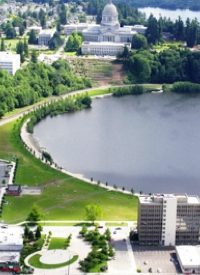
The Reality Church in Olympia, Washington is considering filing suit against the state government for denying its request to perform a baptism in a public park.
Over the weekend, the church had hoped to use Heritage Park (pictured at left), a public park near the state Capitol, for a baptism ceremony and a barbecue. So as not to use the park’s 260-acre manmade lake to conduct the baptisms, they planned to use a portable baptistry; but their request was denied. The church is now examining its legal options to determine whether the state has violated its own constitution.
A spokesman for the Washington state government, Steve Valandra, explained the reason for the denial:
We approved their permit for the barbecue, but our state constitution does not allow public grounds or funds to be used for religious ceremonies so we got advice from our attorney general’s office and we denied their permit for the baptism.
Although state officials pointed to Washington’s constitution to defend their decision, Article One simply reads, “No public money shall be appropriated or applied to any religious worship, exercise or instruction, or the support of any religious establishment.”
Washington state’s government has relied on that section of its constitution to justify banning “any indoor religious displays” not sponsored by the state of Washington in buildings on the Capitol campus.
The Blaze notes:
This rule was instituted in December 2008 following debate surrounding various religious displays. The Bellingham Herald further explains these incidents, writing that the government “was caught in [a] church-state controversy over the display of atheist signs near a nativity and a menorah inside the Capitol.” By issuing harsher regulations, the state may be hoping to avoid similar issues in the future.
However, observers note that even if it was the goal of Washington’s state government to take a uniform approach to religious displays and events, it has failed to be consistent. For example, in 2009, the state’s Department of General Administration approved a request to host a prayer rally near the Tivoli Fountain on the Capitol campus, attended by the Governor and several state legislators.
According to Jordan Sekulow, of the American Center for Law and Justice , the denied request for the baptism was both morally and legally wrong. “They’re basically saying the barbecue is just fine — but … you can’t baptize anyone. … So now you’ve got a state saying this is too much religious activity so it’s not really speech anymore. This violates the U.S. Constitution.”
Sekulow believes the church has constitutional grounds to launch a suit against the state. If nothing else, he says, the case may serve to resolve the ambiguity of what is and is not permitted on government land in Washington.
According to Sekulow, the case may even have the potential to set a national precedent, something that may bode well for the American people, as many state governments have engaged in overreaching behavior in incidents similar to this one.
For example, in 2005, a resident assistant at a University of Wisconsin dormitory was told that he could not hold informal Bible study sessions in the dorm because it would amount to an illegal endorsement of religion by a state employee.
Likewise, code enforcement officials in San Diego banned a pastor and his wife from holding Bible studies in their home because they did not obtain a Major Use Permit from the county, a permit that is regularly used for compliance with traffic, parking, and environmental issues.
Though Reality Church has yet to decide what steps it will take, one thing seems certain: There may be more at stake than a simple permit to perform baptisms at a public park.




